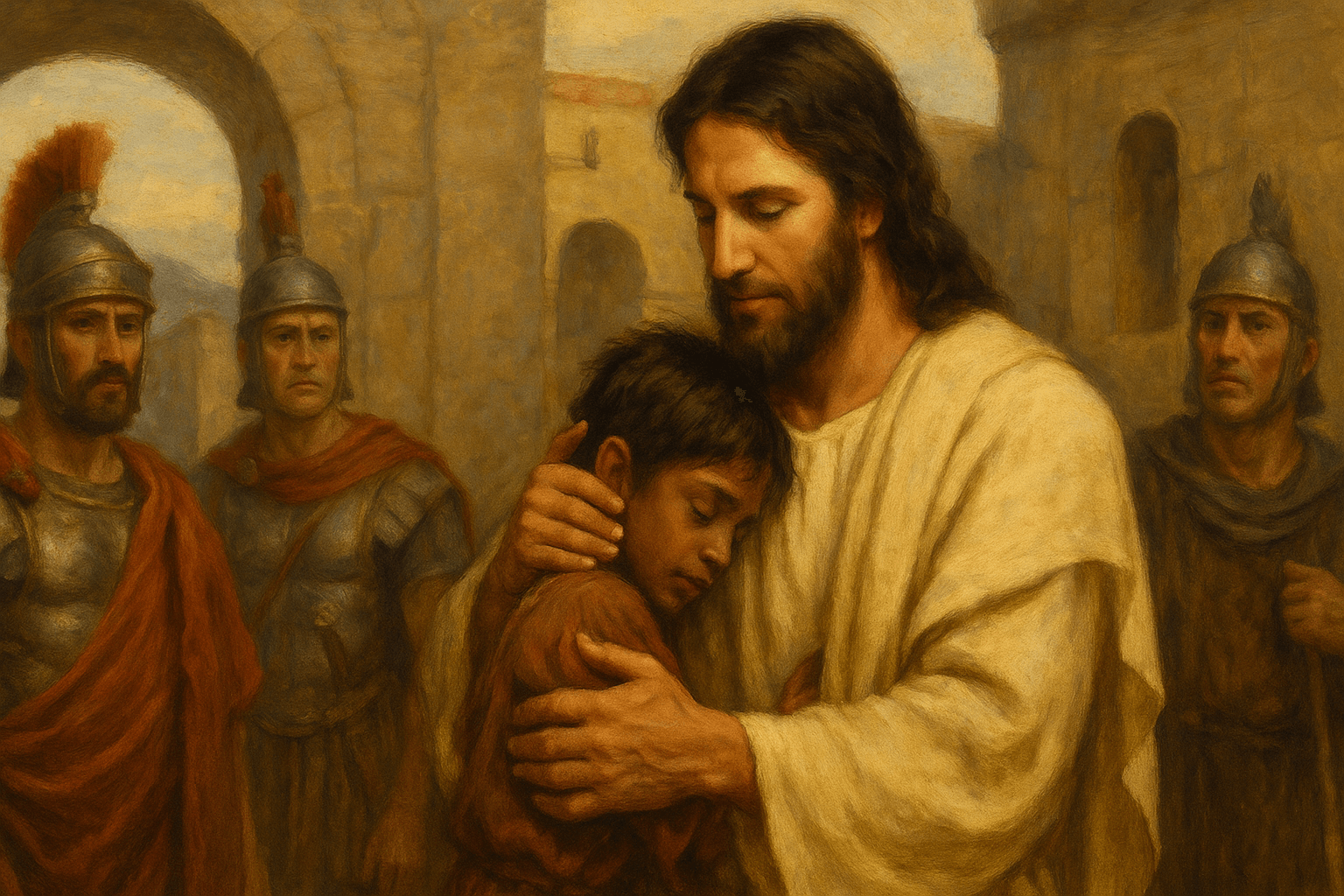Why You Feel Like You Are Always 33 Jesus Christ And Eternal Purpose
Discover why your soul feels spiritually drawn to the age of 33. Explore how Jesus’ life at 33 reveals your eternal identity and calling in God.

Discover life-changing biblical steps to reconciliation that bring peace, healing, and restored relationships through Jesus and the power of the Holy Spirit.
.png)
In a world where conflict is all too common, Christians are called to a higher path: reconciliation. Whether the pain comes from a broken friendship, a fractured family, or a disagreement within the church, the Bible offers divine wisdom for healing and restoration. These are not mere suggestions but transformative truths that shape the Christian life. The biblical steps to reconciliation are more than a roadmap; they are a reflection of God's heart, His grace, and His eternal plan for peace among His people.
Jesus, our Savior, modeled the path of forgiveness and reconciliation, bridging the infinite gap between humanity and God. As His disciples, we are invited to walk this same path. But how do we begin? What does the Bible really say about making things right? And how can we experience not just peace with others, but deep spiritual growth in the process?
In this article, we will explore the clear steps to reconciliation in the Bible, uncover fascinating biblical customs, and experience the surprising power of God's love in restoring what once seemed lost.
.png)
"If your brother or sister sins against you, go and tell them their fault, between you and them alone. If they listen to you, you have gained your brother."
— Matthew 18:15
Before reconciliation can begin, we must acknowledge the pain. Denying hurt only deepens the wound. The Bible calls us to honesty—not just with others, but with ourselves and with God.
It may seem loving to overlook pain, but true love does not ignore truth. Addressing the offense directly is a spiritual act of courage, rooted in the belief that healing is possible. Jesus instructs us to approach our brother or sister in private, not to accuse but to restore. This initial step protects dignity and fosters trust.
In first-century Jewish culture, public shame was devastating. Thus, private confrontation was both compassionate and culturally wise. Interestingly, Jesus' instruction in Matthew 18 reflects a Jewish tradition of "tochacha," a loving rebuke aimed at restoration, not punishment.
Before initiating reconciliation, bring your hurt to God. Through prayer, we gain perspective and the Holy Spirit prepares our hearts. This act invites God’s love into our pain and aligns us with His desire for unity. Forgiveness often begins in the secret place of prayer.
.png)
"Be kind and compassionate to one another, forgiving each other, just as in Christ God forgave you."
— Ephesians 4:32
True reconciliation requires mutual humility. Whether we are the offender or the wounded, we are called to both seek and offer forgiveness.
Asking for forgiveness is more than an apology; it is a recognition of wrong and a plea for grace. It disarms pride and invites healing. In biblical times, offenders often brought tangible tokens of peace—a practice rooted in the sacrificial system, symbolizing the cost of wrongdoing.
Grace is unearned, and when extended, it mirrors the heart of the gospel. Consider Joseph, who forgave his brothers despite deep betrayal. His words in Genesis 50:20 reveal a profound truth: "You intended to harm me, but God intended it for good."
Forgiveness is not forgetting; it's choosing not to hold the offense against the person. When Christians forgive, they reflect God's mercy and invite the Holy Spirit to mend what was broken.
.png)
"Repent, then, and turn to God, so that your sins may be wiped out, that times of refreshing may come from the Lord."
— Acts 3:19
Repentance is more than regret. It's a God-centered transformation that realigns our actions and intentions.
Genuine repentance produces visible change. Zacchaeus, the tax collector, promised to return four times what he had stolen (Luke 19:8), showing that heartfelt remorse is followed by righteous action.
Confessing sin to one another, as encouraged in James 5:16, invites healing and accountability. This act, once common in early Christian gatherings, was a powerful expression of communal faith and trust.
Repentance does not end with guilt. It leads to joy and restoration, ushering in what Scripture calls "times of refreshing." Through repentance, the Christian life becomes a living testimony of God's transformative grace.
.png)
"Carry each other’s burdens, and in this way you will fulfill the law of Christ."
— Galatians 6:2
Reconciliation is not a single moment, but a journey. Once forgiveness is offered and repentance is evident, trust must be carefully rebuilt.
Trust, once broken, takes time to rebuild. The early Church, when reconciling former persecutors like Paul, required witness to changed behavior before full acceptance (Acts 9:26-28). Patience and community support were vital.
Forgiveness does not always mean returning to the same relational closeness. Sometimes, boundaries are necessary for healing. Boundaries, when rooted in love, protect both parties and honor the journey toward wholeness.
In the Christian life, discipleship often includes accountability. Having mature believers walk alongside us helps nurture trust and keeps us aligned with God's truth.
.png)
"Make every effort to keep the unity of the Spirit through the bond of peace."
— Ephesians 4:3
God calls His people to live in unity. Reconciliation culminates in restored fellowship, a beautiful reflection of the kingdom of God.
The early Church included Jews and Gentiles, rich and poor, men and women. The unifying factor was Jesus. Their love across differences shocked the ancient world and drew many to salvation.
Sharing meals was sacred in biblical times, symbolizing full acceptance and peace. When the Prodigal Son returned, his father prepared a feast. Fellowship is a celebration of reconciliation.
Every act of reconciliation on earth mirrors the eternal reconciliation we have in Christ. It is a foretaste of heaven, where every tribe and tongue will worship together (Revelation 7:9).
Reconciliation is not always easy, but it is always sacred. As followers of Jesus, we are called to be peacemakers, agents of God's love in a divided world. Each step—acknowledging hurt, seeking forgiveness, embracing repentance, restoring trust, and rebuilding fellowship—brings us closer to the heart of God.
Let us walk this path with humility, led by the Holy Spirit, trusting that what is impossible with man is possible with God. In doing so, we embody the grace we have received and reflect the eternal life that is ours in Christ. May the love of Jesus shine through every reconciled relationship, and may our lives testify to the power of the gospel to heal, restore, and unite.
Discover why your soul feels spiritually drawn to the age of 33. Explore how Jesus’ life at 33 reveals your eternal identity and calling in God.

Discover why so many feel spiritually connected to the age of 33 and how it reflects Jesus’ eternal calling to love faith and discipleship

Discover the shocking truths behind Jesus’ teachings that flipped the ancient world upside down — and still challenge us today!

Discover how to find biblical precepts and apply them to your Christian life. Learn how God’s Word guides faith, prayer, discipleship, and grace.

Discover the life-changing moral lesson of the Good Samaritan and how it reveals Jesus’ call to live a compassionate, faith-filled Christian life.
.png)
Discover all the biblical victories of Archangel Michael and how they inspire Christians today. Explore Scripture, faith, and God’s eternal victory.
.png)
Find comfort and restoration through this heartfelt Christian prayer and guide for emotional healing. Discover hope in Jesus and strength in God’s love.
.png)
Discover a Christ-centered beginner’s guide to praying the rosary. Grow in faith, peace, and discipleship through this scriptural Christian prayer practice.

Discover how unanswered prayers can deepen your faith, teach patience, and draw you closer to Jesus Christ’s enduring love.
 (1).png)
Explore essential spiritual disciplines such as prayer, scripture meditation, worship, and fasting to deepen your faith and relationship with Jesus Christ.
.png)
Discover how to overcome fear by deepening your faith, trusting God's promises, and embracing biblical principles to live courageously and peacefully
.png)
Are you asking questions like, "Can I be Christian and still...?" Explore biblical and grace-filled answers about tattoos, therapy, doubt, and more.

Discover 7 powerful Christian marriage secrets every couple needs to know. Strengthen your relationship through prayer, faith, and God-centered love with practical, biblical advice.

Discover how authentic Christian friendships sharpen your faith, deepen your discipleship, and reflect Christ’s transformative love in everyday life.
.png)